新视野大学英语读写教程(一)unit1听力原文和翻译
- 格式:doc
- 大小:39.50 KB
- 文档页数:7
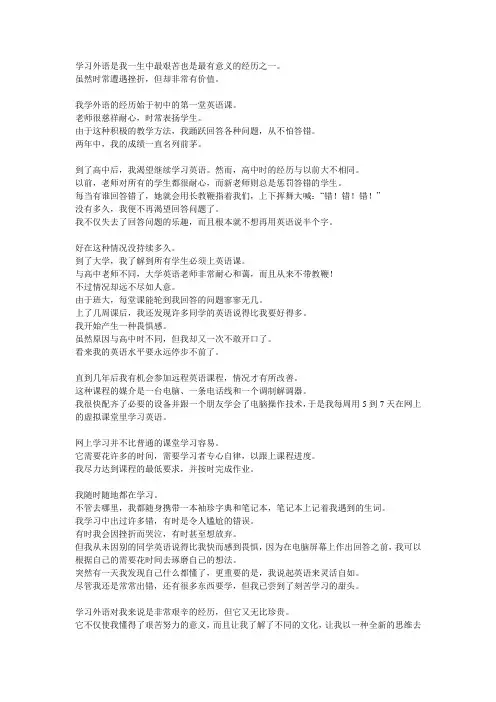
学习外语是我一生中最艰苦也是最有意义的经历之一。
虽然时常遭遇挫折,但却非常有价值。
我学外语的经历始于初中的第一堂英语课。
老师很慈祥耐心,时常表扬学生。
由于这种积极的教学方法,我踊跃回答各种问题,从不怕答错。
两年中,我的成绩一直名列前茅。
到了高中后,我渴望继续学习英语。
然而,高中时的经历与以前大不相同。
以前,老师对所有的学生都很耐心,而新老师则总是惩罚答错的学生。
每当有谁回答错了,她就会用长教鞭指着我们,上下挥舞大喊:“错!错!错!”没有多久,我便不再渴望回答问题了。
我不仅失去了回答问题的乐趣,而且根本就不想再用英语说半个字。
好在这种情况没持续多久。
到了大学,我了解到所有学生必须上英语课。
与高中老师不同,大学英语老师非常耐心和蔼,而且从来不带教鞭!不过情况却远不尽如人意。
由于班大,每堂课能轮到我回答的问题寥寥无几。
上了几周课后,我还发现许多同学的英语说得比我要好得多。
我开始产生一种畏惧感。
虽然原因与高中时不同,但我却又一次不敢开口了。
看来我的英语水平要永远停步不前了。
直到几年后我有机会参加远程英语课程,情况才有所改善。
这种课程的媒介是一台电脑、一条电话线和一个调制解调器。
我很快配齐了必要的设备并跟一个朋友学会了电脑操作技术,于是我每周用5到7天在网上的虚拟课堂里学习英语。
网上学习并不比普通的课堂学习容易。
它需要花许多的时间,需要学习者专心自律,以跟上课程进度。
我尽力达到课程的最低要求,并按时完成作业。
我随时随地都在学习。
不管去哪里,我都随身携带一本袖珍字典和笔记本,笔记本上记着我遇到的生词。
我学习中出过许多错,有时是令人尴尬的错误。
有时我会因挫折而哭泣,有时甚至想放弃。
但我从未因别的同学英语说得比我快而感到畏惧,因为在电脑屏幕上作出回答之前,我可以根据自己的需要花时间去琢磨自己的想法。
突然有一天我发现自己什么都懂了,更重要的是,我说起英语来灵活自如。
尽管我还是常常出错,还有很多东西要学,但我已尝到了刻苦学习的甜头。

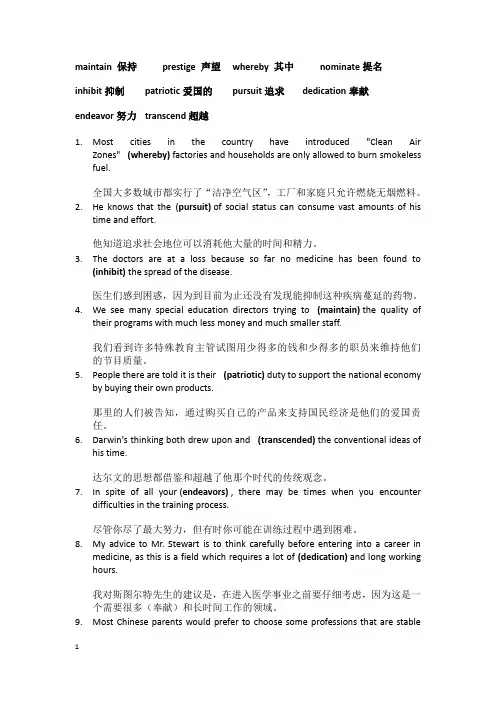
maintain 保持prestige 声望whereby 其中nominate提名inhibit抑制patriotic爱国的pursuit追求dedication奉献endeavor努力transcend超越1. Most cities in the country have introduced "Clean AirZones" (whereby) factories and households are only allowed to burn smokeless fuel.全国大多数城市都实行了“洁净空气区”,工厂和家庭只允许燃烧无烟燃料。
2. He knows that the (pursuit) of social status can consume vast amounts of histime and effort.他知道追求社会地位可以消耗他大量的时间和精力。
3. The doctors are at a loss because so far no medicine has been found to(inhibit) the spread of the disease.医生们感到困惑,因为到目前为止还没有发现能抑制这种疾病蔓延的药物。
4. We see many special education directors trying to (maintain) the quality oftheir programs with much less money and much smaller staff.我们看到许多特殊教育主管试图用少得多的钱和少得多的职员来维持他们的节目质量。
5. People there are told it is their (patriotic) duty to support the national economyby buying their own products.那里的人们被告知,通过购买自己的产品来支持国民经济是他们的爱国责任。
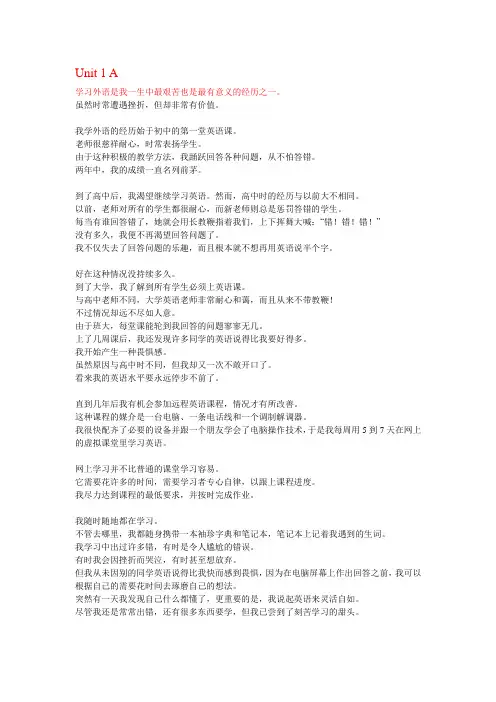
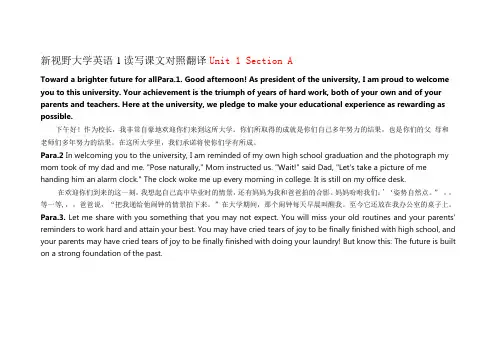
新视野大学英语1读写课文对照翻译Unit 1 Section AToward a brighter future for allPara.1. Good afternoon! As president of the university, I am proud to welcome you to this university. Your achievement is the triumph of years of hard work, both of your own and of your parents and teachers. Here at the university, we pledge to make your educational experience as rewarding as possible.下午好!作为校长,我非常自豪地欢迎你们来到这所大学。
你们所取得的成就是你们自己多年努力的结果,也是你们的父母和老师们多年努力的结果。
在这所大学里,我们承诺将使你们学有所成。
Para.2 In welcoming you to the university, I am reminded of my own high school graduation and the photograph my mom took of my dad and me. "Pose naturally," Mom instructed us. "Wait!" said Dad, "Let's take a picture of me handing him an alarm clock." The clock woke me up every morning in college. It is still on my office desk.在欢迎你们到来的这一刻,我想起自己高中毕业时的情景,还有妈妈为我和爸爸拍的合影。
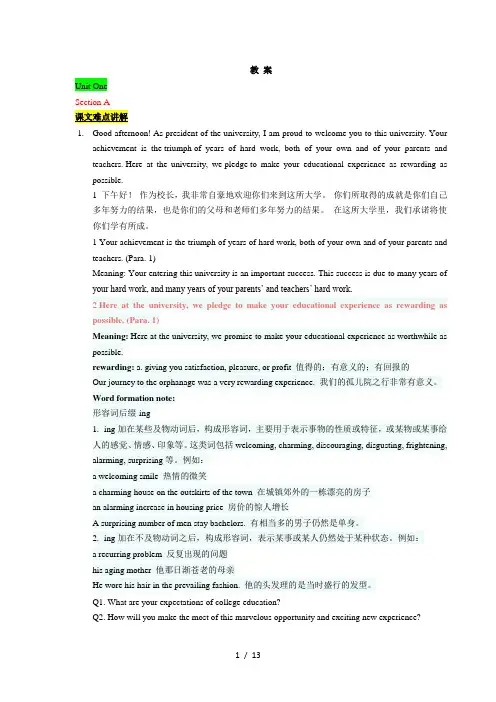
教案Unit OneSection A1.Good afternoon! As president of the university, I am proud to welcome you to this university. Yourachievement is the triumph of years of hard work, both of your own and of your parents and teachers. Here at the university, we pledge to make your educational experience as rewarding as possible.1 下午好!作为校长,我非常自豪地欢迎你们来到这所大学。
你们所取得的成就是你们自己多年努力的结果,也是你们的父母和老师们多年努力的结果。
在这所大学里,我们承诺将使你们学有所成。
1 Your achievement is the triumph of years of hard work, both of your own and of your parents andteachers. (Para. 1)Meaning: Your entering this university is an important success. This success is due to many years of your hard work, and many years of your parents’ and teachers’ hard work.2 Here at the university, we pledge to make your educational experience as rewarding aspossible. (Para. 1)Meaning: Here at the university, we promise to make your educational experience as worthwhile as possible.rewarding: a. giving you satisfaction, pleasure, or profit 值得的;有意义的;有回报的Our journey to the orphanage was a very rewarding experience. 我们的孤儿院之行非常有意义。

Scripts ( 新视野大学英语《听说教程》1 ) Unit 1I. Understanding Short Conversation1. W: I saw an ad on the Internet about online language studies.M: Me too. I saw an ad for, “Click Here for Language Learning.”Q: What do the man and the woman have in common2. M: You have to be 18 years old to enter some online language classes.W: Really I had no idea that there was a minimum age required for some classes.Q: What did the woman NOT know about online language classes before3. M: Unlike regular classes, online classes can be taken at your home.W: That’s exactly why I decided to begin studying online!Q: Why did the woman decide to study online4. W: I keep on making new friends as I study online.M: So do I! There are so many people online, ad I want to meet them all!Q: What is one benefit of studying online5. M: My online teacher asked the class for suggestions to make the class better.W: That’s great! I always like it when a teacher does that.Q: What did the man’s teacher want to do6. M: I had no idea that online language learning could be so effective!W: It sure has helped me practice my language skills!Q: What is it about online language learning that surprised the man7. M: My classmates and I help each other solve homework problems online.W: It sounds like you’re using the Internet in a useful way.Q: What does the man do online8. M: Online learning is ideal for anyone who doesn’t have time to travel to school.W: Yes, but it also has its own challenges.Q: What does the woman have to say about online learning9. M: Virtual classrooms are changing how students study!W: They sure are! And I, for one, am very excited about it.Q: According to the man, what is happening to students because of virtual classrooms: What advice did your professor give youW: He said that taking an online class would help me learn.Q: What did the woman’s professor suggest1—10: B C A C D, C C A B DII. Understanding a Long ConversationW: How’s your new online class, Bill Is it everything you had hoped forM: It’s everything and more, Susan. You should give it a try!W: Oh, really What’s the best thing about itM: In an online class, you talk with others over the Internet. Since they are not right next to you, they don’t bother you so much.W: That sounds great! I took a class with someone who would make me feel small whenever I made a mistake. He would tell me how stupid I was and intimidate me so that I never wanted to participate.M: Not a problem in the virtual classroom. How would you like to sign up I think that you could start on the third of next month.W: I don’t know, Bill. You know all those problems about having difficult people in the classroom M: YeahW: We don’t really have them anymore since you left.1.Which of the following is NOT true about Bill2.According to Bill, why are other students NOT a concern in an online class3.Why did Susan NOT like to participate in class4.When could Susan start studying online5.Why did Susan NOT make up her mind to join online class1—5: A B B D AIII. Understanding a PassageThe first requirement for my online language class was to meet in an online forum. I entered the forum early and saw students appear on the screen one after another. Strangely enough, when it was time to begin, the teacher still hadn’t shown up. However, we began sharing information and talking about the new class. Unlike me, all of the other students were new to the online class. I told them about my experiences and my thoughts. Then I noticed something. There were 27 people in the forum. This was strange because I know there were only 26 people in the class.“Hey,” I wrote, “which one of you is the teacher”The teacher made herself known at last. She said that wanted to get our honest opinions about the online class. Also, she wanted to have a little fun with us. “Humor will be important in my class,” she said.1.What was the first requirement of the online class2.What was strange about the beginning of the online class3.How were the other students different than the speaker4.What did the speaker notice5.Why did the teacher NOT make herself known to the class at first1---5: A A C D DProfessor Stromwell: I am, personally, very 1) honored to introduce this year’s class-elected speaker. After getting off to a quite 2) interesting start here at Harvard, she graduates today with an 3) invitation to join one of Boston’s most prestigious law firms. I am sure we are going to see 4) great things from her. Ladies and gentlemen: Elle Woods.Elle: On our very first day at Harvard, a very 5) wise professor quoted Aristotle, “The law is 6) reason free from passion.” Well, no offense to Aristotle, but in my three years at Harvard I have come to find that passion is a 7) key ingredient to the study and practice of law --- and of life. It is with passion, courage of conviction, and strong 8) sense of self that we take our next steps into the world, remembering that first 9) impressions are not always correct. You must always have faith in people. And most 10) importantly, you must always have faith in yourself. Congratulations class of 2004 ---we did it!Story-retellingOne day, a student was taking a very difficult essay exam. 1) At the end of the test, the professor asked all the students to put their pencils down and hand in their test papers. They young mankept writing furiously. 2) Although he was warned that if he did not stop immediately his paper would be rejected, he ignored the warning, finished the test ten minutes later, and went to hand the test paper to his professor. The professor told him he would not accept the test paper.3) The student asked, “Do you know who I am”The professor said, “No and I don’t care.”4) The student asked again, “Are you sure you don’t know who I am”The professor said, “Yes.” 5) S o, the student walked over to the pile of tests, placed his in the middle, and then threw the papers in the air.“Good,” the student said, and walked out.Homework Supplementary Listening Task 1M: All right, everyone. Good work. That’s all for today’s class. Does anyone have any questions W: Excuse me, professor. I have a question. I’m worried about my English skills. I get good marks on tests, but I don’t feel that I’m learning a lot.M: Not exactly a question is it, Winnie But it’s a good concern. Many advanced English learners have a large “passive vocabulary”, but they worry about their “active vocabulary”. They can understand many difficult English words when reading or listening, but they don’t use most of them when speaking or writing in English. They feel this is a problem. They would like to use all the difficult words that they know.W: Do you think that I use too few wordsM: That’s not what I’m saying at all. Actually, I’m saying the opposite thing.W: I’m afraid I don’t understand.M: In your native language, there are also thousands of words that you understand but you don’t use. So your active vocabulary in your native language is much smaller than your passive vocabulary. And I guess that you are not worried about that.W: No, I’m not. But I would like to use the new words that I learn in my English classes. How else am I going to remember themM: Now that’s a very good question.W: I was hoping that you had an answer to this question.M: Winnie, you don’t need to worry about using “too few”English words. As your needs for different things grow, you will be able to use your new words more and more. I think you’d be surprised by how much you know.W: So your advice to me is “Don’t worry.” Now I’m worried that I’m paying too much for school.1.Who are likely to worry about their active vocabulary2.What is “active vocabulary” according to the professor3.What do many English learners want to do4.What does the professor say about vocabulary in one’s native language5.What does the professor want to tell Winnie1---5: D D A B DTask 2The biggest problem most people face in learning English is their own fear. They worry that they won’t say things correctly so they don’t speak English at all. Don’t do this. Don’t let a little fear stop you from getting what you want.The best way to learn English is to surround yourself with it. The more English material you have around you, the faster you will learn and the more likely you will begin thinking in English.Music can be a very effective tool to learning English. The best way is to use the lyrics and try to read them as the artist sings. This way you can practice your listening and reading at the same time.Watching English movies is not only fun but also very effective. By watching English movies, you can expand your vocabulary and learn the natural flows of speech from actors.1.What is the biggest problem that many English learners have2.Why do some English learners NOT speak English at all3.What is the best way to learn English according to the speaker4.What is the best way to learn English through music5.How can you benefit from watching English movies1---5: B B D A C。
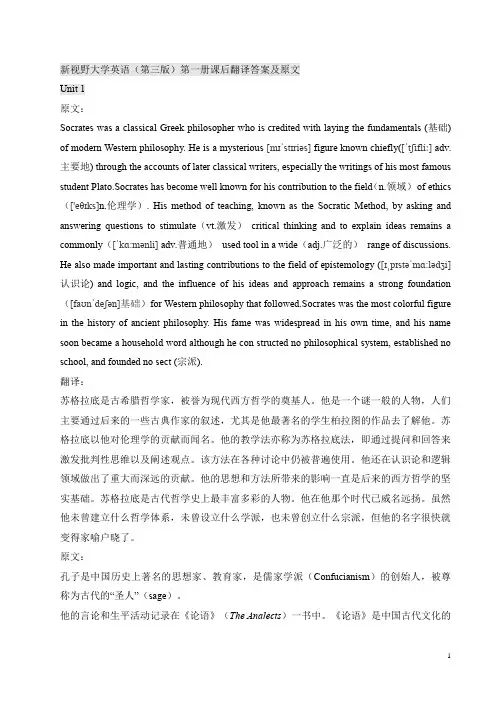
新视野大学英语(第三版)第一册课后翻译答案及原文Unit 1原文:Socrates was a classical Greek philosopher who is credited with laying the fundamentals (基础) of modern Western philosophy. He is a mysterious [mɪˈstɪriəs] figure known chiefly([ˈtʃifliː] adv.主要地) through the accounts of later classical writers, especially the writings of his most famous student Plato.Socrates has become well known for his contribution to the field(n.领域)of ethics (['eθɪks]n.伦理学). His method of teaching, known as the Socratic Method, by asking and answering questions to stimulate(vt.激发)critical thinking and to explain ideas remains a commonly([ˈkɑ:mənli] adv.普通地)used tool in a wide(adj.广泛的)range of discussions. He also made important and lasting contributions to the field of epistemology ([ɪˌpɪstəˈmɑ:lədʒi]认识论) and logic, and the influence of his ideas and approach remains a strong foundation ([faʊnˈdeʃən]基础)for Western philosophy that followed.Socrates was the most colorful figure in the history of ancient philosophy. His fame was widespread in his own time, and his name soon became a household word although he con structed no philosophical system, established no school, and founded no sect (宗派).翻译:苏格拉底是古希腊哲学家,被誉为现代西方哲学的奠基人。

maintain 保持prestige 声望whereby 其中nominate提名inhibit抑制patriotic爱国的pursuit追求dedication奉献endeavor努力transcend超越1. Most cities in the country have introduced "Clean AirZones" (whereby) factories and households are only allowed to burn smokeless fuel.全国大多数城市都实行了“洁净空气区”,工厂和家庭只允许燃烧无烟燃料。
2. He knows that the (pursuit) of social status can consume vast amounts of histime and effort.他知道追求社会地位可以消耗他大量的时间和精力。
3. The doctors are at a loss because so far no medicine has been found to(inhibit) the spread of the disease.医生们感到困惑,因为到目前为止还没有发现能抑制这种疾病蔓延的药物。
4. We see many special education directors trying to (maintain) the quality oftheir programs with much less money and much smaller staff.我们看到许多特殊教育主管试图用少得多的钱和少得多的职员来维持他们的节目质量。
5. People there are told it is their (patriotic) duty to support the national economyby buying their own products.那里的人们被告知,通过购买自己的产品来支持国民经济是他们的爱国责任。
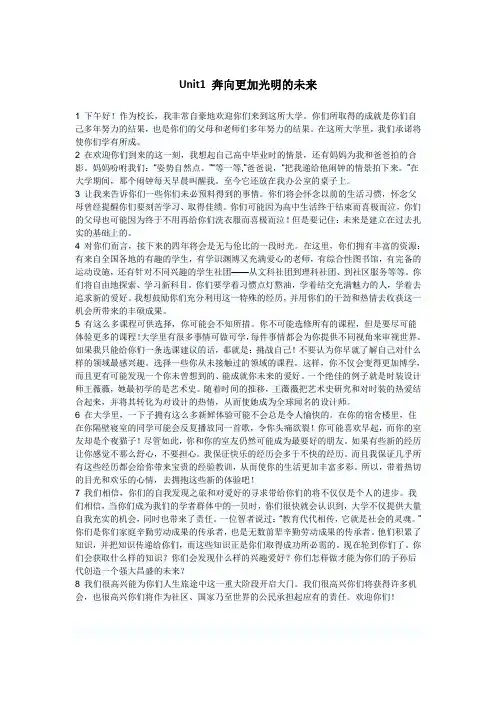
Unit1 奔向更加光明的未来1 下午好!作为校长,我非常自豪地欢迎你们来到这所大学。
你们所取得的成就是你们自己多年努力的结果,也是你们的父母和老师们多年努力的结果。
在这所大学里,我们承诺将使你们学有所成。
2 在欢迎你们到来的这一刻,我想起自己高中毕业时的情景,还有妈妈为我和爸爸拍的合影。
妈妈吩咐我们:“姿势自然点。
”“等一等,”爸爸说,“把我递给他闹钟的情景拍下来。
”在大学期间,那个闹钟每天早晨叫醒我。
至今它还放在我办公室的桌子上。
3 让我来告诉你们一些你们未必预料得到的事情。
你们将会怀念以前的生活习惯,怀念父母曾经提醒你们要刻苦学习、取得佳绩。
你们可能因为高中生活终于结束而喜极而泣,你们的父母也可能因为终于不用再给你们洗衣服而喜极而泣!但是要记住:未来是建立在过去扎实的基础上的。
4 对你们而言,接下来的四年将会是无与伦比的一段时光。
在这里,你们拥有丰富的资源:有来自全国各地的有趣的学生,有学识渊博又充满爱心的老师,有综合性图书馆,有完备的运动设施,还有针对不同兴趣的学生社团——从文科社团到理科社团、到社区服务等等。
你们将自由地探索、学习新科目。
你们要学着习惯点灯熬油,学着结交充满魅力的人,学着去追求新的爱好。
我想鼓励你们充分利用这一特殊的经历,并用你们的干劲和热情去收获这一机会所带来的丰硕成果。
5 有这么多课程可供选择,你可能会不知所措。
你不可能选修所有的课程,但是要尽可能体验更多的课程!大学里有很多事情可做可学,每件事情都会为你提供不同视角来审视世界。
如果我只能给你们一条选课建议的话,那就是:挑战自己!不要认为你早就了解自己对什么样的领域最感兴趣。
选择一些你从未接触过的领域的课程。
这样,你不仅会变得更加博学,而且更有可能发现一个你未曾想到的、能成就你未来的爱好。
一个绝佳的例子就是时装设计师王薇薇,她最初学的是艺术史。
随着时间的推移,王薇薇把艺术史研究和对时装的热爱结合起来,并将其转化为对设计的热情,从而使她成为全球闻名的设计师。
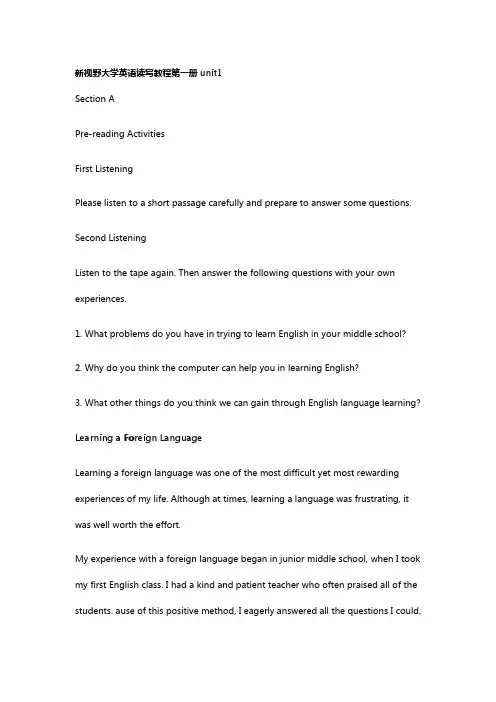
新视野大学英语读写教程第一册unit1Section APre-reading ActivitiesFirst ListeningPlease listen to a short passage carefully and prepare to answer some questions. Second ListeningListen to the tape again. Then answer the following questions with your own experiences.1. What problems do you have in trying to learn English in your middle school?2. Why do you think the computer can help you in learning English?3. What other things do you think we can gain through English language learning? Learning a Foreign LanguageLearning a foreign language was one of the most difficult yet most rewarding experiences of my life. Although at times, learning a language was frustrating, it was well worth the effort.My experience with a foreign language began in junior middle school, when I took my first English class. I had a kind and patient teacher who often praised all of the students. ause of this positive method, I eagerly answered all the questions I could,never worrying much about making mistakes. I was at the top of my class for two years.When I went to senior middle school, I was eager to continue studying English; however, my experience in senior school was very different from before. While my former teacher had been patient with all the students, my new teacher quickly punished those who gave incorrect answers. Whenever we answered incorrectly, she pointed a long stick at us and, shaking it up and down, shouted, "No! No! No!" It didn't take me long to lose my eagerness to answer questions. Not only did I lose my joy in answering questions, but also I totally lost my desire to say anything at all in English.However, that state didn't last long. When I went to college, I learned that all students were required to take an English course. Unlike my senior middle school teacher, my college English teachers were patient and kind, and none of them carried long, pointed sticks! However, the situation was far from perfect. As our classes were very large, I was only able to answer a couple of questions in each class period. Also, after a few weeks of classes, I noticed there were many students who spoke much better than I did. I began to feel intimidated. So, once again, although for different reasons, I was afraid to speak. It seemed my English was going to stay at the same level forever.That was the situation until a couple of years later, when I was offered an opportunity to study English through an online course. The communicationmedium was a computer, phone line, and modem. I soon got access to the necessary equipment, learned the technology from a friend and participated in the virtual classroom 5 to 7 days a week.Online learning is not easier than regular classroom study; it requires much time, commitment and discipline to keep up with the flow of the course. I worked hard to meet the minimum standards set by the course and to complete assignments on time.I practiced all the time. I carried a little dictionary with me everywhere I went, as well as a notebook in which I listed any new words I heard. I made many, sometimes embarrassing, mistakes. Once in a while I cried with frustration, and sometimes I felt like giving up. But I didn't feel intimidated by students who spoke faster than I did ause I took all the time I needed to think out my ideas and wrote a reply before posting it on the screen. Then, one day I realized I could understand just about everything I came across, and most importantly, I could "say" anything I wanted to in English. Although I still made many mistakes and was continually learning, I had finally reaped the benefits of all that hard work.Learning a foreign language has been a most trying experience for me, but one that I wouldn't trade for anything. Not only did learning another language teach me the value of hard work, but it also gave me insights into another culture, and my mind was opened to new ways of seeing things. The most wonderful result of having learned a foreign language was that I could communicate with many more peoplethan before. Talking with people is one of my favorite activities, so being able to speak a new language lets me meet new people, participate in converions, and form new, unforgettable friendships. Now that I speak a foreign language, instead of staring into space when English is being spoken, I can participate and make friends. I am able to reach out to others and bridge the gap between my language and culture and theirs.Section BKeys to Successful Online LearningWhile regular schools still exist, the virtual classroom plays an important role in today's learning community. Job opportunities for students are expanding rapidly and more people of all ages are oming aware of online learning that allows them to study at home. Online students, however, require unique qualities to be successful. The following list discusses some ideal qualities of successful online students.1. Be open-minded about sharing life, work, and learning experiences as part of online learning.Many different people find that the online method requires them to use their experiences and that online learning offers them a place to communicate with each other. This forum for communication removes the visual barriers that hinder some students from expressing themselves. In addition, students are given time to reflecton the information before replying. In this way, students can help to keep the online environment open and friendly.2. Be able to communicate through writing.In the virtual classroom nearly all communication is written, so it is critical that students feel comfortable expressing themselves in writing. Some students have limited writing abilities which need to be improved before or as part of the online experience. This usually requires extra commitment by these students. Whether working alone or in a group, students share ideas, perspectives and discussions on the subject being studied, and read about those of their classmates. In this way, students gain at insight from their peers, learning from each other as well as the instructor.3. Be willing to "speak up" if problems arise.Remember that instructors cannot see their students in an online course. This means students must be absolutely explicit with their comments and requests. If they experience technical difficulties, or problems in understanding something about the course, they MUST speak up; otherwise there is no way anyone can know something is wrong. If one person does not understand something, possibly several others have the same problem. If another student is able to help, she/he probably will. While explaining something to others, students reinforce their own knowledge about the subject.4. Take the program seriously.Online learning is not easier than study in regular classrooms. In fact, many students say it requires much more time and effort. Requirements for online courses are not less than those of any quality program. Successful students, however, see online learning as a convenient way to receive their education —not an easier way. Many online students sit at computers for hours at a time during evenings and on weekends in order to complete their assignments. When other people are finished and having fun is most likely the time when online students do their course work. Online students need to commit 4 to 15 hours a week for each course.5. Accept critical thinking and decision making as part of online learning.Online courses require students to make decisions based on facts as well as experience. It is absolutely necessary for students to assimilate information and make the right decisions based on critical thinking. In a positive online environment, students feel valued by the instructor, by their classmates and by their own work.6. Be able to think ideas through before replying.Providing meaningful and quality input into the virtual classroom is an essential part of online learning. Time is given to allow for careful development of answers. Testing and challenging of ideas is encouraged. Many times online students will not always be right; they just need to be prepared to accept a challenge.7. Keep up with the pross of the course.Online learning is normally sequential and requires commitment on the students' part. Keeping up with the face-to-face class and completing all work on time is vital. Once students get behind, it is almost impossible to catch up. Students need to want to be there and need to want the experience. The instructor may have to communicate with students personally to offer help and remind them of the need to keep up.Just as many excellent instructors may not be effective online facilitators, not all students have the necessary qualities to perform well online. People who have the qualities discussed above usually make very successful online students. If you have these qualities, learning online may be one of the best discoveries you will ever make.新视野大学英语读写教程第一册课文原文unit2Section APre-reading ActivitiesFirst ListeningYou are about to read an early morning exchange between a daughter and her parents.Second ListeningDiscuss the following questions after the second listening.1. What are some of the things you think the daughter and her parents might have different ideas about?2. How can the older and the younger generation have real communication with and understand each other?A Busy Weekday MorningThe radio clicked on. Rock music blasted forth. Like a shot, the music woke Sandy. She looked at the clock; it was 6:15 A.M. Sandy sang along with the words as she lay listening to her favorite radio station."Sandy," shouted her father. "Sandy, turn that music off!" Steve Finch burst into her room. "Why do you have to listen to such horrible stuff? It's the same thing over and over. I'm not sure it is really music though it does have rhythm. Hmmm. No, it isn't really music. It's weird. It is definitely horrible stuff.""I like that music, Dad; it's my favorite group —Gre en Waves. Listen for a minute; I'm sure you'll like it. It has a really powerful message. Didn't you ever listen to music like this when you were a youngster?" Sandy reached for the radio to turn it up louder."No, no, don't do that. I can't stand it. The music I listened to had a message, too, but the words were clear and the musicians didn't use such offensive language. Turn that radio down so your mother and I can't hear it. I'm sure that music ishurting your ears as well as your brain. Now, would you please hurry up and turn it off? Get ready for school or you'll be late!"Sandy walked into the bathroom and turned on the shower. At first, the water felt cold. It helped her wake up. Then, as the water got hotter, she thought, "This shower feels great and in here I can be alone and sing. No one disturbs me in here." She grabbed the soap and washed thoroughly, including her hair. If she stayed in the shower too long, her mom or dad usually banged on the door to rush her so she grabbed a towel and dried off.After her shower, Sandy brushed her hair, put on her old, gre en T-shirt and some jeans and wrapped her sweater around her shoulders. Then she put on her makeup, grabbed her books and went to the kitchen.She looked at the clock again; it was late. As usual, she didn't know what to have for breakfast, so she grabbed a glass of milk and ate a piece of toast while standing by the sink. Just then, her mother, Jane, entered the kitchen."Sandy, why don't you sit down and eat your breakfast? It isn't healthy to eat standing up.""I know. Mom, but I'm already late for school. I don't have time to sit down and eat.""Did you finish your homework, dear?""Yes.""Do you have your instrument?""Uh-huh.""And your lunch?""Yah.""Did you brush your teeth?""Mom, I haven't finished eating breakfast yet. I'll brush my teeth when I'm done." "You should brush your teeth when you wake up and then brush them again after breakfast. Sandy, why are you wearing that old T-shirt? It's disgusting. I know you have some nice blouses in your closet.""Mom, please stop.""Stop what, dear?""Stop bugging me.""Sandy, are you wearing eye-liner?""Yes, Mom, I've been wearing eye-liner for months. Isn't it pretty? It's called French Lilac Blue. I just love it." Sandy pretended not to notice that her mother was a little annoyed."Sandy Finch, you're too young to wear that much makeup. Please go upstairs and wash it off.""Mom, I'm fifteen. I'm old enough to wear makeup. Believe me, all the girls at school wear makeup. Some have tattoos and pierced ears, and noses and tongues, too. Mom, I don't have time to talk about this now —I'm late. I've got to go. See you later." Sandy kissed her mother quickly on the cheek, picked up her books, and bolted out of the house.As she ran to catch the school bus, Sandy thought of her older brother Bill who was away at college. He phoned her often so they could talk and share their problems, but she hadn't heard from him for a while. She missed him. Since Bill had gone to college, her mother bugged Sandy much more than before, and she was arguing with her mother a lot more than usual, too.Section BParent TalkAfter Sandy had left for school, Jane Finch sat down in peace and quiet to drink her coffee. She sipped slowly and tried to read the newspaper. Soon her husband joined her."Would you like some coffee, Steve?" asked Jane."No thanks, honey. My stomach feels upset —like it's full of knots. It's probably that awful music that wakes me up every morning. I don't think I'm old-fashioned but hearing those tuneless, offensive lyrics repeatedly makes my blood boil. There is no message to them either. I can't believe Sandy really likes that stuff.""You know, honey, different music appeals to different generations," reasoned Jane. "Remember some of the music we listened to?"Steve smiled. "You're right. Maybe eating breakfast will help me get rid of some of the knots in my stomach.""I'll get you some juice," she offered, starting to get up."That's okay," said Steve. "I'll get it. You're reading.""I'm not really reading. I'm distracted. I've been thinking about Sandy too."Steve prepared his breakfast and then sat down with his wife. She gave him a section of the newspaper and they both tried to read for a few moments. Then Jane broke the silence."Did you notice how much makeup our fifteen-year-old daughter was wearing this morning? When I asked about it, she told me she's been wearing eyeliner for months. I can't believe I never noticed. I suppose we should feel lucky bec ause makeup is our biggest problem with her. I've seen other teenagers walking around town with tattoos and piercings all over their bodies—in their eyebrows, their noses, everywhere. I suppose they're expressing their identity but it's so very different from what we did.""Is it so different?" asked Steve. "I remember defying my parents when I gre w my hair long. Remember? It was so long it was down below my shoulders.""And you almost got expelled from school," added Jane."That's true but my hair could be cut. These tattoos are permanent. Tattoos seem radical to me.""Actually, tattoos can be removed," said Jane. "It's painful and expensive but they can be removed. Every generation seems to need to identify itself.""What worries me," said Steve, "is that music has a very negative message. It could have a negative influence on Sandy. I don't know what's happening to our little girl. She's changing and I'm concerned about her. Makeup, terrible music —who knows what will be next? We need to have a talk with her. The news is full of stories about teenagers in trouble whose parents hardly know anything about their problems.""Oh, I don't think her music is so terrible. I like it." said Jane."You like it? ""You know I like loud, weird music. Anyway, you're right. We need to have a talk with Sandy," a gre ed Jane.Jane glanced at the clock. "Oh dear, I'm late!" she moaned. "I have to run or I'll be late for my first appointment." She kissed her husband quickly, picked up her briefcase, and started for the door."Bye, honey," called Jane."Bye, dear," answered Steve.As Jane Finch drove to work, she thought about her children, Sandy and Bill. "Sandy is beginning to mature," she thought. "Soon she'll be dating and going out but I don't want her wasting her time talking on the phone and watching TV. I want her to do well in school and to continue her music. How can I tell her these things? I don't want her to get angry with me. If I'm too strict, she'll rebel. I often worry she may rebel and go too far. So many young girls rebel, drop out of school and get into all kinds of trouble. Sometimes they even run away from home. I wouldn't want that to happen to Sandy."Jane knew what she wanted to say, what she had to say to Sandy. She was so glad that she and Sandy could still talk things over. She knew she had to have patience and keep the lines of communication with her daughter open. She wanted to be there as an anchor for her but at the same time she would give her her freedom to find her own identity.新视野大学英语读写教程第一册课文Unit 3Section APre-reading ActivitiesFirst ListeningHaving ideas about a story before you read it is an important reading skill. Please listen to a very short piece of recording.Second ListeningNow listen to the recording for the second time and try to the best of your ability to answer the following questions.1. Why do you think people stared at the father and the son?2. What do you think a "good heart" is?3. What is the difference between how the son felt about his father as a youth and how he feels many years later?4. Now read the story below. How close did you come to knowing the answers before you read the whole story?A Good Heart to Lean OnMore than I realized, Dad has helped me keep my balance.When I was growing up, I was embarrassed to be seen with my father. He was severely crippled and very short, and when we walked together, his hand on my arm for balance, people would stare. I would inwardly struggle at the unwanted attention. If he ever noticed or was bothered, he never let on.It was difficult to coordinate our steps —his halting, mine impatient —and ause of that, we didn't say much as we went along. But as we started out, he always said, "You set the pace. I will try to adjust to you."Our usual walk was to or from the subway on which he traveled to work. He went to work sick, and despite nasty weather. He almost never missed a day, and would make to the office even if others could not. A matter of pride.When snow or ice was on the ground, it was impossible for him to walk, even with help. At such times my sisters or I would pull him through the streets of Brooklyn, N.Y., on a child's wagon with steel runners to the subway entrance. Once there, he would cling to the hand-rail until he reached the lower steps that the warmer tunnel air kept free of ice. In Manhattan the subway station was the basement of his office building, and he would not have to go outside again until we met him in Brooklyn on his way home.When I think of it now, I am amazed at how much courage it must have taken for a grown man to subject himself to such shame and stress. And at how he did it—without bitterness or complaint.He never talked about himself as an object of pity, nor did he show any envy of the more fortunate or able. What he looked for in others was a "good heart", and if he found one, the owner was good enough for him.Now that I am older, I believe that is a proper standard by which to judge people, even though I still don't know precisely what a "good heart" is. But I know the times I don't have one myself.Unable to engage in many activities, my father still tried to participate in some way. When a local baseball team found itself without a manager, he kept it going. He was a knowledgeable baseball fan and often took me to Ebbets Field to see the Brooklyn Dodgers play. He liked to go to dances and parties, where he could have a good time just sitting and watching.On one occasion a fight broke out at a beach party, with everyone punching and shoving. He wasn't content to sit and watch, but he couldn't stand unaided on the soft sand. In frustration he began to shout, "I'll fight anyone who will sit down with me! I'll fight anyone who will sit down with me!"Nobody did. But the next day people kidded him by saying it was the first time any fighter was urged to take a dive before the fight began.I now know he participated in some things through me, his only son. When I played ball (poorly), he "played" too. When I joined the Navy, he "joined" too. And when I came home on leave, he saw to it that I visited his office. Introducing me, he was really saying, "This is my son, but it is also me, and I could have done this, too, if things had been different." Those words were never said aloud.He has been gone many years now, but I think of him often. I wonder if he sensed my reluctance to be seen with him during our walks. If he did, I am sorry I never told him how sorry I was, how unworthy I was, how I retted it. I think of him when I complain about trifles, when I am envious of another's good fortune, when I don't have a "good heart."At such times I put my hand on his arm to regain my balance, and say, "You set the pace. I will try to adjust to you."Section BThe Right Son at the Right TimeThe story began on a downtown Brooklyn street corner. An elderly man had collapsed while crossing the street, and an ambulance rushed him to Kings County Hospital. There, when he came to now and again, the man repeatedly called for his son.From a worn letter located in his pocket, an emergency-room nurse learned that his son was a Marine stationed in North Carolina. Apparently there were no other relatives.Someone at the hospital called the Red Cross office in Brooklyn, and a request for the boy to rush to Brooklyn was sent to the Red Cross director of the North Carolina Marine Corps camp.ause time was short —the patient was dying —the Red Cross man and an officer set out in an army vehicle. They found the young man walking through some marshes in a military exercise. He was rushed to the airport in time to catch the sole plane that might enable him to reach his dying father.It was dusk when the young Marine walked into the entrance lobby of Kings County Hospital. A nurse took the tired, anxious serviceman to the bedside."Your son is here," she said to the old man. She had to repeat the words several times before the patient's eyes opened. The medicine he had been given because of the pain from his heart attack made his eyes weak and he only dimly saw the young man in Marine Corps uniform standing outside the oxygen tent. He extended his hand. The Marine wrapped his strong fingers around the old man's limp ones, squeezing a message of love and encouragement. The nurse brought a chair, so the Marine could sit by the bed.Nights are long in hospitals, but all through the night the young Marine there in the dimly-lit ward, holding the old man's hand and offering words of hope and strength. Occasionally, the nurse urged the Marine to rest for a while. He refused. Whenever the nurse came into the ward, the Marine was there, but he paid no attention to her and the night noises of the hospital —the banging of an oxygen tank, the laughter of the night staff exchanging etings, the cries and moans and breathing of other patients. Now and then she heard him say a few gentle words. The dying man said nothing, only held tightly to his son through most of the night. It was nearly dawn when the patient died. The Marine placed the lifeless hand he had been holding on the bed, and went to inform the nurse. While she did what she had to do, he smoked a cigarette, his first since he got to the hospital.Finally, she returned to the nurse's station, where he was waiting. She started to offer words of sympathy, but the Marine interrupted her. "Who was that man?" he asked."He was your father," she answered, startled."No, he wasn't," the Marine replied. "I never saw him before in my life.""Why didn't you say something when I took you to him?" the nurse asked."I knew immediately there'd been a mistake, but I also knew he needed his son, and his son just wasn't here. When I realized he was too sick to tell whether or not I was his son, I guessed he really needed me. So I stayed. "With that, the Marine turned and exited the hospital. Two days later a message came in from the North Carolina Marine Corps base informing the Brooklyn Red Cross that the real son was on his way to Brooklyn for his father's funeral. It turned out there had been two Marines with the same name and similar numbers in the camp. Someone in the personnel office had pulled out the wrong record.But the wrong Marine had ome the right son at the right time. And he proved, in a very human way, that there are people who care what happens to their fellow men. 新视野大学英语读写教程第一册课文unit4Section APre-reading ActivitiesFirst ListeningPlease listen to a short passage carefully and prepare to answer some questions.Second ListeningListen to the tape again. Then answer the following questions with your own experiences.1. How long does it take us to judge the people we meet?2. What is one way you can have a positive effect on other people?3. What is the key to being the best person you can be?How to Make a Good ImpressionResearch shows we make up our minds about people through unspoken communication within seven seconds of meeting them. Consciously or unconsciously, we show our true feelings with our eyes, faces, bodies and attitudes, causing a chain of reactions, ranging from comfort to fear.Think about some of your most unforgettable meetings: an introduction to your future spouse, a job interview, an encounter with a stranger. Focus on the first seven seconds. What did you feel and think? How did you "read" the other person? How do you think he read you?You are the message. For 25 years I've worked with thousands who want to be successful. I've helped them make persuasive presentations, answer unfriendly questions, communicate more effectively. The secret has always been you are the message.Others will want to be with you and help you if you use your good qualities. They include: physical appearance, energy, rate of speech, pitch and tone of voice, gestures, expression through the eyes, and the ability to hold the interest of others. Others form an impression about you based on these.Think of times when you know you made a good impression. What made you successful? You were committed to what you were talking about and so absorbed in the moment, you lost all self-consciousness.Be yourself. Many how-to books advise you to stride into a room and impress others with your qualities. They instruct you to et them with "power handshakes" and tell you to fix your eyes on the other person. If you follow all this advice, you'll drive everyone crazy —including yourself.The trick is to be consistently you, at your best. The most effective people never change from one situation to another. They’re the same whether they're having a converion, addressing their garden club or being interviewed for a job. They communicate with their whole being; the tones of their voices and their gestures match their words.Public speakers, however, often send mixed messages. My favorite is the kind who say, "Ladies and gentlemen. I'm very happy to be here" —while looking at their shoes. They don't look happy. They look angry, frightened or depressed.。
Unit1What we wish我们的期望My dear child,我亲爱的孩子:You are about to participate in the next leg of yourjourney through life. For us, this part is bittersweet.As you go off to college, exciting new worlds willop en up to you. They will inspire and challenge you; you will grow in incredibl e ways.你即将踏上人生的下一段旅程。
这让我们感到喜忧参半。
当你离家、步入大学的校门,激动人心的崭新世界将会展现在你面前。
这将带给你鼓舞,也会使你面临挑战;你将获得更大的进步与成长。
This is also a moment of sadness. Your departure to college makes it unden iably clear thatyou are no longer a child. There has been no greater joy than watching you arrive at thismoment. You have turned our greatest challenge i nto our greatest pride. Although we havebrought you to this point, it is hard to watch you depart. Remember above all things, we willmiss you.这也是令人伤感的时刻。
离家去上大学就明确意味着你不再是个孩子了。
没有什么比看到你走到今天这一步更令我们欣喜的了。
你曾经是我们最大的挑战,现在却成为我们最大的骄傲。
第一单元奔向更加光明的未来1 下午好!作为校长,我非常自豪地欢迎你们来到这所大学。
你们所取得的成就是你们自己多年努力的结果,也是你们的父母和老师们多年努力的结果。
在这所大学里,我们承诺将使你们学有所成。
2 在欢迎你们到来的这一刻,我想起自己高中毕业时的情景,还有妈妈为我和爸爸拍的合影。
妈妈吩咐我们:“姿势自然点。
” “等一等,”爸爸说,“把我递给他闹钟的情景拍下来。
” 在大学期间,那个闹钟每天早晨叫醒我。
至今它还放在我办公室的桌子上。
3 让我来告诉你们一些你们未必预料得到的事情。
你们将会怀念以前的生活习惯,怀念父母曾经提醒你们要刻苦学习、取得佳绩。
你们可能因为高中生活终于结束而喜极而泣,你们的父母也可能因为终于不用再给你们洗衣服而喜极而泣!但是要记住:未来是建立在过去扎实的基础上的。
4 对你们而言,接下来的四年将会是无与伦比的一段时光。
在这里,你们拥有丰富的资源:有来自全国各地的有趣的学生,有学识渊博又充满爱心的老师,有综合性图书馆,有完备的运动设施,还有针对不同兴趣的学生社团——从文科社团到理科社团、到社区服务等等。
你们将自由地探索、学习新科目。
你们要学着习惯点灯熬油,学着结交充满魅力的人,学着去追求新的爱好。
我想鼓励你们充分利用这一特殊的经历,并用你们的干劲和热情去收获这一机会所带来的丰硕成果。
5 有这么多课程可供选择,你可能会不知所措。
你不可能选修所有的课程,但是要尽可能体验更多的课程!大学里有很多事情可做可学,每件事情都会为你提供不同视角来审视世界。
如果我只能给你们一条选课建议的话,那就是:挑战自己!不要认为你早就了解自己对什么样的领域最感兴趣。
选择一些你从未接触过的领域的课程。
这样,你不仅会变得更加博学,而且更有可能发现一个你未曾想到的、能成就你未来的爱好。
一个绝佳的例子就是时装设计师王薇薇,她最初学的是艺术史。
随着时间的推移,王薇薇把艺术史研究和对时装的热爱结合起来,并将其转化为对设计的热情,从而使她成为全球闻名的设计师。
Unit1A学习外语是我一生中最艰苦也是最有意义的经历之一。
虽然时常遭遇挫折,但却非常有价值。
我学外语的经历始于初中的第一堂英语课。
老师很慈祥耐心,时常表扬学生。
由于这种积极的教学方法,我踊跃回答各种问题,从不怕答错。
两年中,我的成绩一直名列前茅。
到了高中后,我渴望继续学习英语。
然而,高中时的经历与以前大不相同。
以前,老师对所有的学生都很耐心,而新老师则总是惩罚答错的学生。
每当有谁回答错了,她就会用长教鞭指着我们,上下挥舞大喊:“错!错!错!”没有多久,我便不再渴望回答问题了。
我不仅失去了回答问题的乐趣,而且根本就不想再用英语说半个字。
好在这种情况没持续多久。
到了大学,我了解到所有学生必须上英语课。
与高中老师不同,大学英语老师非常耐心和蔼,而且从来不带教鞭!不过情况却远不尽如人意。
由于班大,每堂课能轮到我回答的问题寥寥无几。
上了几周课后,我还发现许多同学的英语说得比我要好得多。
我开始产生一种畏惧感。
虽然原因与高中时不同,但我却又一次不敢开口了。
看来我的英语水平要永远停步不前了。
直到几年后我有机会参加远程英语课程,情况才有所改善。
这种课程的媒介是一台电脑、一条电话线和一个调制解调器。
我很快配齐了必要的设备并跟一个朋友学会了电脑操作技术,于是我每周用5到7天在网上的虚拟课堂里学习英语。
网上学习并不比普通的课堂学习容易。
它需要花许多的时间,需要学习者专心自律,以跟上课程进度。
我尽力达到课程的最低要求,并按时完成作业。
我随时随地都在学习。
不管去哪里,我都随身携带一本袖珍字典和笔记本,笔记本上记着我遇到的生词。
我学习中出过许多错,有时是令人尴尬的错误。
有时我会因挫折而哭泣,有时甚至想放弃。
但我从未因别的同学英语说得比我快而感到畏惧,因为在电脑屏幕上作出回答之前,我可以根据自己的需要花时间去琢磨自己的想法。
突然有一天我发现自己什么都懂了,更重要的是,我说起英语来灵活自如。
尽管我还是常常出错,还有很多东西要学,但我已尝到了刻苦学习的甜头。
Unit1 奔向更加光明的未来1 下午好!作为校长,我非常自豪地欢迎你们来到这所大学。
你们所取得的成就是你们自己多年努力的结果,也是你们的父母和老师们多年努力的结果。
在这所大学里,我们承诺将使你们学有所成。
2 在欢迎你们到来的这一刻,我想起自己高中毕业时的情景,还有妈妈为我和爸爸拍的合影。
妈妈吩咐我们:“姿势自然点。
”“等一等,”爸爸说,“把我递给他闹钟的情景拍下来。
”在大学期间,那个闹钟每天早晨叫醒我。
至今它还放在我办公室的桌子上。
3 让我来告诉你们一些你们未必预料得到的事情。
你们将会怀念以前的生活习惯,怀念父母曾经提醒你们要刻苦学习、取得佳绩。
你们可能因为高中生活终于结束而喜极而泣,你们的父母也可能因为终于不用再给你们洗衣服而喜极而泣!但是要记住:未来是建立在过去扎实的基础上的。
4 对你们而言,接下来的四年将会是无与伦比的一段时光。
在这里,你们拥有丰富的资源:有来自全国各地的有趣的学生,有学识渊博又充满爱心的老师,有综合性图书馆,有完备的运动设施,还有针对不同兴趣的学生社团——从文科社团到理科社团、到社区服务等等。
你们将自由地探索、学习新科目。
你们要学着习惯点灯熬油,学着结交充满魅力的人,学着去追求新的爱好。
我想鼓励你们充分利用这一特殊的经历,并用你们的干劲和热情去收获这一机会所带来的丰硕成果。
5 有这么多课程可供选择,你可能会不知所措。
你不可能选修所有的课程,但是要尽可能体验更多的课程!大学里有很多事情可做可学,每件事情都会为你提供不同视角来审视世界。
如果我只能给你们一条选课建议的话,那就是:挑战自己!不要认为你早就了解自己对什么样的领域最感兴趣。
选择一些你从未接触过的领域的课程。
这样,你不仅会变得更加博学,而且更有可能发现一个你未曾想到的、能成就你未来的爱好。
一个绝佳的例子就是时装设计师王薇薇,她最初学的是艺术史。
随着时间的推移,王薇薇把艺术史研究和对时装的热爱结合起来,并将其转化为对设计的热情,从而使她成为全球闻名的设计师。
<p1>Learning a foreign language was one of the most difficult yet most <2>rewarding</2> experiences of my life.<p2>Although at times learning a language was <3>frustrating</3>, it was well worth the effort.<p3>My experience with learning a foreign language began in <4>junior</4> middle school, when I took my first English class.I had a kind and patient teacher who often praised all of the students.<p4>Because of this <5>positive</5> method, I eagerly answered all the questions I could, never worrying much about making mistakes.<p5>I was at the top of my class for two years.When I went to <6>senior</6> middle school, I was eager to continue studying English; however, my experience in senior middle school was very different from before.<p6>While my <7>former</7> teacher had been patient with all of the students, my new teacher quickly punished those who gave incorrect answers.Whenever we answered incorrectly, she pointed a long stick at us and, shaking it up and down, shouted, "No! No! No!"<p7>It didn't take me long to lose my eagerness to answer questions.<p8>Not only did I lose my joy in answering questions, but I also lost my desire to say anything at all in English.However, that state didn't last long.When I went to college, I learned that all students were required to take an English course.<p9><8>Unlike</8> my senior middle school teacher, my college English teachers were patient and kind, and none of them carried long, pointed sticks!<p10>The situation was far from perfect, though.As our classes were very large, I was only able to answer a couple of questions in each class period.Also, after a few weeks of classes, I noticed there were many students who spoke much better than I did.<p11>I began to feel <9>intimidated</9>.So, once again, although for different reasons, I was afraid to speak.It seemed my English was going to stay at the same level forever.<p12>That was the situation until a couple of years later when I was offered an <10>opportunity</10> to study English through an <11>online</11> course.The <12>communication</12> <13>medium</13> was a computer, a phone line, and a <14>modem</14>.<p13>I soon got <15>access</15> to the necessary equipment, learned how to use the technology from a friend and <16>participated</16> in the <17>virtual</17> classroom 5 to 7 days a week.<p14>Online learning is not easier than regular classroom study;it requires a lot of time, <18>commitment</18> and <19>discipline</19> to keep up with the flow of the course.<p15>I worked hard to meet the <20>minimum</20> standards set by the course and to complete <21>assignments</21> on time.I practiced all the time.I carried a little dictionary with me everywhere I went, as well as a notebook in which I listed any new words I heard.<p16>I made many, sometimes <23>embarrassing</23>, mistakes.<p17>Once in a while I cried out of <24>frustration</24>, and sometimes I felt like giving up.<p18>But I didn't feel intimidated by students who spoke faster than I did because I took all the time I needed to think out my ideas and wrote a reply before <25>posting</25> it on the screen. <p19>Then, one day I realized I could understand just about everything I came across, and most importantly, I could "say" anything I wanted to in English.<p20>Although I was still making many mistakes and was <27>continually</27> learning new ways to say things, I had finally <28>reaped</28> the <29>benefits</29> of all of my hard work.<p21>Learning a foreign language has been a most trying experience for me, but one that I wouldn't trade for anything.<p22>Not only did learning another language teach me the value of hard work, but it also gave me <30>insights</30> into another culture, and my mind was opened to new ways of seeing things. The most wonderful result of having learned a foreign language was that I could <31>communicate</31> with many more people than before.Talking with people is one of my <32>favorite</32> activities, so being able to speak a new language lets me meet new people, participate in conversations, and form new, unforgettable friendships.<p23>Now that I speak a foreign language, instead of staring into space when English is being spoken,I can participate and make friends.<p24>I am able to reach out to others and bridge the <33>gap</33> between my language and culture and theirs.学习外语是我一生中最艰苦也是最有意义的经历之一。